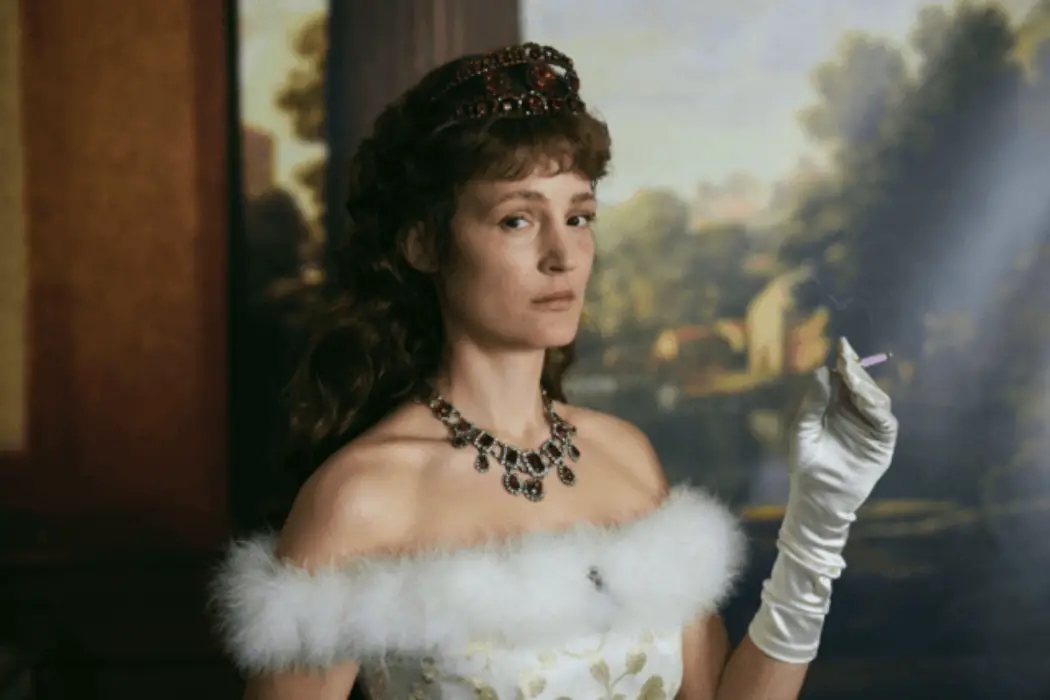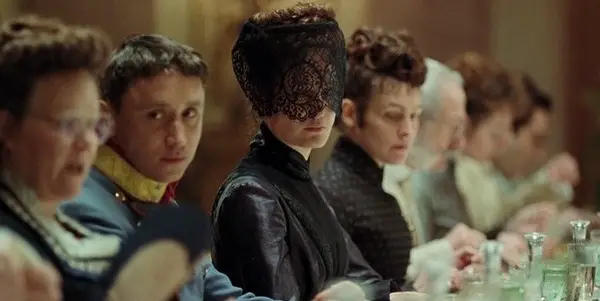Cannes Film Festival 2022: CORSAGE Is A Fresh, Fantastic Take On The Suffering Royal Woman Story

Ryan Coleman is a writer and film critic from the…
A corsage can refer to one of two things, depending on where you’re from. If you’re American, the word probably conjures an image of a bundle of dewy, freshly budded flowers pinned to the wrist of a woman off to a formal gala, or more likely a girl to her senior prom. If you’re European, corsage is closer to corset. It refers to the bodice of a dress, the shaping instrument crafted like a second ribcage, made once upon a time from whalebone.
If you were a woman like Élisabeth Amélie Eugénie de Wittelsbach, better known as Sissi, Empress of Austria, your fine education would have availed you of the word’s double meaning — and you’d appreciate the irony. The irrepressible Sissi presided over the Austro-Hungarian empire for roughly the entire second half of the 19th century. Suicide attempts, assassination attempts (the final, successful, in 1898), contentious forays into anti-war agitation, and highly public mistreatment at the hands of her husband and mother-in-law were the thorns that stuck to the bloom of Sissi’s legendary life. Every rose, so it goes, has its thorns.
German writer-director Marie Kreutzer’s new treatment of the story of Sissi, called Corsage, and starring Vicky Krieps as the eternal empress, premiered in the Un Certain Regard section of this year’s Cannes Film Festival on May 21st. Amidst a sea of dull, insipid, even sadistic takes on the beautiful, suffering royal lady story we’ve been awash in lately (looking at you, Spencer), Corsage breaks like the sun through the clouds. Anchored by a ravishing lead performance from Krieps, Corsage is a beautifully photographed dive into the psychology of a fascinating, tortured woman, who one character in the film describes as “a book with a riddle on each page.”
Not Your Mother’s Sissi
The most famous portrayal of Sissi on film is Romy Schneider’s, from the 1955 Ernst Marischka film simply titled Sissi. The film made Schneider an international star, and remains a classic, particularly in German and Austrian households, where it’s often watched around Christmas time.
That tells you basically what you need to know about Schneider and Marischka’s Sissi — she’s a warm, bubbly princess sashaying around in frothy skirts, laughing a great deal, and always looking gorgeous. If you were to screen Corsage for the family around Christmastime, they might take your presents back.

Kreutzer follows less from Marischka than she does from someone like Albert Serra, one of the 21st century’s most idiosyncratic and damning critics of the noble class. The most direct antecedent to Corsage is Serra’s The Death of Louis XIV, in which an exquisitely coiffed and bejeweled French king slowly rots dies in bed for 120 minutes.
Nothing so gruesome happens in Corsage — on the surface. As is often the case with women’s pain in a man’s world, it’s forced deep within the body, where it can’t offend men’s great sensitivity, or provoke their intolerance. There, it takes a toll on the psyche, and here is where Kreutzer picks Corsage up and cuts her diamond.
Pain and Beauty
Corsage takes place in 1878, in the lead-up to Sissi’s 40th birthday. “At the age of 40 a person begins to disappear, like a dark cloud…” she tells one of her handmaids. Like Diana of Wales, Sissi of Austria was born into a lesser family and shot up the class ladder when she was “selected” to be Emperor Franz Joseph I’s wife.

We don’t see Sissi before the glitz and gore of the royal office get to her, and we don’t get to watch her go through the acclimation process. We catch up with her at the end of her rope. In the opening scene, we meet her underwater, holding her breath as long as possible in a frightening “endurance test.” She jumps out of a window after the Emperor delivers a crushing insult, starts taking heroin medically as soon as its invented, and murmurs things like, “I had resolved to die. I just didn’t have sufficient expertise.”
Krieps manages to reveal glimpses of the young, vivacious Sissi that the history books discuss and that Marischka immortalized. But those few embers of vitality have largely been stomped out by constant reprimands to lose weight, to smile, to say the right things, to keep it together.
In one powerfully succinct visual metaphor, Sissi has one of her handmaids impersonate her for a brief decoration ceremony, by donning a black lace mask that obscures her face. She barely makes it through the ceremony and has to run back inside to throw up, because the corse she wore for 20 minutes was so tight. Sissi laughs; she’s worn it every day for 20 years.
A Probing Psychological Portrait
Kreutzer does the right thing by not girlbossifying Sissi—luxuriating in her pain, and insisting on how kind and noble and courageous she was. Sissi is depicted as a malignant narcissist. But the heartbreaking revelation Kreutzer achieves is to show the way that vanity and its shadow, self-consciousness, were forced onto Sissi, replacing any sense of self rooted in friends, family, and community with an anxious, ever-shifting investment in her own surface.
“I have nothing to hold except myself,” Sissi tells a photographer, “and even that seems like an incredible effort sometimes.” Corsage is heartbreaking, but it’s also very funny, deftly paced, and gorgeous to look at. Following the incredible 2019 thriller The Ground Beneath My Feet, Corsage crowns Kreutzer as a leading voice in German cinema.
What do you think of films about royal women? Let us know in the comments below!
Corsage premiered at the Cannes Film Festival on May 20, 2022. Ryan Coleman is part of the inaugural Unifrance Critics Lab.
Does content like this matter to you?
Become a Member and support film journalism. Unlock access to all of Film Inquiry`s great articles. Join a community of like-minded readers who are passionate about cinema - get access to our private members Network, give back to independent filmmakers, and more.
Ryan Coleman is a writer and film critic from the San Gabriel Valley. He is a member of the LA Press Club and the Managing Editor of Ampersand LA. His work can be found in the LA Review of Books, Little White Lies, Jumpcut, Rue Morgue, and more.













